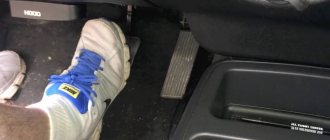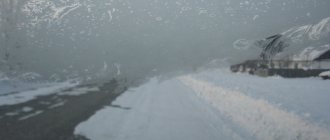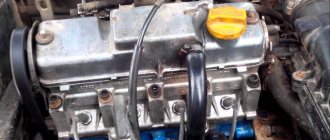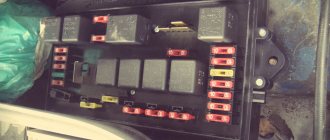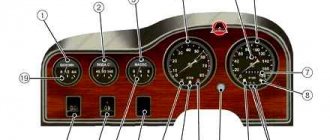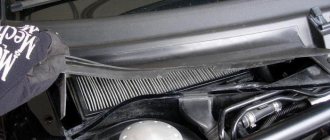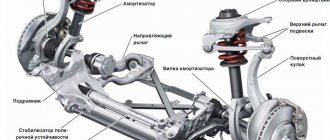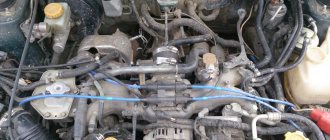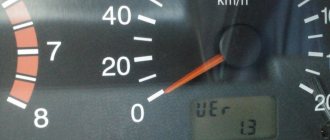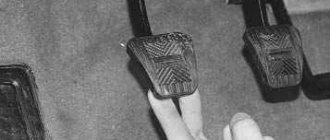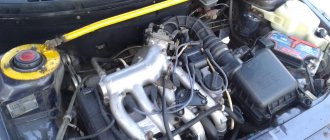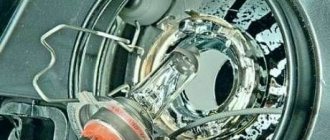The brake system in a car is the most important control element, which means that any manifestations of malfunction, even insignificant at first glance, such as squeaking, squeaking, whistling and others, must be immediately diagnosed and eliminated.
Extraneous sounds during operation of the brake system indicate serious malfunctions and sooner or later can lead to system failure. What these sounds indicate and how to eliminate squeaking brakes will be described in detail below.
Principle of operation
All hydraulic brake systems operate on the same principle:
When you press the brake, the pressure in the brake hydraulic system increases, the brake calipers, through the pistons, press on the brake pads, which are pressed against the disc or drum and, due to the frictional force, slow down or stop it. The pressure (of the calipers) in the brake system directly depends on the force of pressing, that is, on the distance that the brake pedal has traveled. In other words, by pressing the force, you can regulate the pressure and change the braking torque, that is, slow down, or vice versa, with full pressure, you can brake urgently.
The source of unpleasant, extraneous sounds in the brakes can only be moving parts:
- pads (front and rear);
- caliper (piston);
- brake discs or drums (deformation);
- brake pedal (lubrication);
- wheel hub (play);
Tips and tricks for novice drivers
The above list of actions should save you from further squeaks, whistles and squeals from the brake system. However, if only a temporary solution to the problem appears, simply contact the nearest car service center, where they will offer you a full diagnosis of all components of the brake system and identify the malfunction.
Remember:
- It is necessary to replace old pads with new ones after every 75-100 thousand km of the vehicle.
- Buy brake pads and rotors of the same brand and type as the original ones on the car.
- When driving on wet roads, squealing brakes are not uncommon, so dry the brakes a little first.
- To check the serviceability of the pads, perform about 5-10 gradual braking at low speeds.
- Any set of new spare parts, including the brake system, requires a certain amount of time to break in.
Possible causes of squeaking brake system
The squeak that occurs when you press the brake pedal in the operation of the braking system is a special type of resonance with a changing frequency, which appears from vibrations of moving parts of the braking system. These vibrations and resonance are always there, and when the frequency falls into the audible range, our ear perceives it as a creak, a squeak of various tones.
This effect is often used by manufacturers to create a mechanical warning system about maximum brake pad wear. Before serious repairs, you should make sure that the cause of the squeaking brakes does not lie in the operation of this system.
!!!IMPORTANT!!!
If a squeak appears when you press the brake pedal, the first thing you need to do is find out what kind of pad wear system is installed on the car.
Even in modern cars, the manufacturer installs not an electronic one, but a classic, mechanical one, since it is still more reliable. It works like this: a metal plate of a certain length is attached to the inner pad (it always wears out more) and when the pads are worn out to the maximum, this plate begins to touch the brake disc (without scratching or damaging it) and produces a strong and nasty squeak when the brake is pressed. It is impossible to drive like this without replacing the pads and the driver is forced to contact a service center or service station.
It should be noted that the performance of the braking system in such a situation is 100%, only the sound effect does not allow full use of the car.
If a squeaking sound when pressing the brake does not occur due to the fault of the pad wear warning system, then most likely it occurs for the following reasons:
- initial or acquired incompatibility of pad and disc materials. Such incompatibility may appear immediately, or it may be acquired as a result of overheating of the brake system. For example, heating and sudden cooling (if it gets into water) can change the physical properties of friction linings and lead to squeaking;
- The pads wear down to metal and produce a strong “metallic” grinding noise when braking. This often occurs due to the fault of the car owner, but there are other reasons, usually associated with premature wear of the pads as a result of malfunctions. Such defects include: premature wear of the pads on only one side (brake caliper wedging), excessive wear of all pads (malfunction of the vacuum booster), and so on;
- poor-quality replacement of brake pads, in which special anti-squeak plates were not (or incorrectly) installed. These plates are not always included with new pads and must be removed from the old ones, inspected for wear, defects and installed in place using the manufacturer’s recommendations (lubrication, treatment with special materials);
- Uneven wear or distortion of the brake disc or drum. Also one of the most common causes of squeaking. The groove that appears as a result of natural wear of the brake disc, touching the non-working part of the brake pad, often squeaks (especially when installing new ones). Deformations and bending of brake discs and creaking associated with this problem are also quite common, especially in the summer and in mountainous areas. Inexperienced drivers, finding themselves in the conditions of mountain serpentines, often become victims of mountain roads. Without following the basic rules of driving on mountain roads, literally after a few tens of kilometers the entire braking system becomes unusable;
- entry of a foreign object into the gaps of the wheel brake mechanism (stone, piece of wire, etc.);
- Of the non-essential or not related to the brake system, the following causes of squeaking can be noted.
Atmospheric conditions: in frost, heat or high humidity, squeaking of the brakes is allowed during the initial period of vehicle movement.
Increased play in the wheel hub, as a result of which excessive vibrations cause increased noise and creaking, both when driving and when braking.
Reasons why brakes squeak
Low quality
It is possible that the pads you bought are not original, especially if they were purchased somewhere on the market or if they were replaced by a car service with a dubious reputation. In this case, everything is very simple - change the brake pads and the squeaking along with the whistle disappears. If this is not done and ignored, then over time the brake disc will fail, in the end you will have to spend a lot more, and the repair itself will be much more difficult. I advise you to buy brake pads in branded stores or from dealers who have all the certificates confirming the quality and authenticity of these products.
Most common problems
Braking
Since squeaking brakes when braking is one of the main complaints associated with this problem, a whole range of measures is needed to diagnose and eliminate the defect. It is necessary to identify the side that is squeaking, remove the wheel and evaluate the condition of the brake pads.
Measure the runout of the brake disc, the presence of a service groove and, if necessary, grind (on a special machine - stand) or replace the brake discs (if there is a malfunction, a pair of brake discs is always replaced).
Check the presence of metal anti-squeak plates and their condition, make sure that there are no foreign objects in the brake and wheel mechanism, and also evaluate the condition of the suspension and brake caliper parts.
If after checking there is still a squeaking sound when driving, then most likely there is a mismatch in materials, and you should simply replace the brake pads.
Rear brakes
There are many cars with rear drum brakes, and although the design of the brakes is different, the principle of checking and repairing is approximately the same. The rear brakes are used as a parking brake, and sometimes the rear brakes squeak due to the need to simply adjust the handbrake.
When driving
This usually happens when the wheel bearing wears out or the brake disc is bent, when axial vibrations occur. The brake disc reaches the pad and causes vibrations, heard as creaking, squeaking, and so on. Usually eliminating the backlash and replacing parts (discs and pads) eliminates the problem.
Brake pedal
Braking system defects can also include squeaking brake pedal. Such a squeak usually indicates increased friction on the pedal axle. This can have a critical impact on vehicles equipped with ABS, as increased pedal resistance may adversely affect performance. It can be easily eliminated by simply lubricating the bushings and axle with a suitable lubricant.
If, after all the work and activities, the squeaking noise does not go away when you press the brake pedal, you need to turn to professionals, since the braking system is a complex mechanism responsible for safety and even such a small thing as a squeaking sound should not be ignored.
What to do if the caliper creaks or jams
If the brake caliper creaks or jams, and the part is in good condition, you can try to fix the problems yourself. To do this, it is recommended to perform the following set of actions:
- The first step is to unscrew the brake caliper; to do this, you need to put the car on a jack and remove the wheel. It is worth noting that in some car models the caliper can be unscrewed counterclockwise;
- Having removed the caliper, unscrew the piston using a wrench, then it must be pulled out of the cylinder;
- The removed parts must be carefully inspected for chips, rust, corrosion and various damages. If rust is found, it needs to be cleaned well. When the calipers are heavily worn, problems may arise with cleaning the rust with improvised means; in such a situation, the part will need to be sanded;
Brake crunching when braking
The appearance of a grinding noise in the front or rear of the car after pressing the brake pedal does not always indicate a critical breakdown. But the high-pitched vibrating sound is too harsh on the human ear, and after 2-3 days of such driving, the car enthusiast is ready to make any sacrifice just to get rid of the unpleasant squeak. To cope with this problem, you must first determine the reason why the brakes on your car squeak when braking. The problem can be resolved in several ways, described below.
Crunching noise in Prior's brakes
- To the beginning of the forum
- Forum Rules
- Old design
- FAQ
- Search
- Users
There was a shr-shr sound from the rear when braking, and after the rain the right rear was blocked when braking a little, it turned out to be an empty sorcerer gap of 1.3mm, I made a gap of 2.4mm and everything went away.
This sound, a disease of these machines in wet weather, has practically no cure.
What is the reason? Do the pads make that much noise on the drums?
sickness of these cars in wet weather
I also have this kind of grinding sometimes. I scored on him
I scored it too, as a result the fender liner was worn out
I notice such a thing on my car, but only in wet weather until the pads warm up, then this rustling noise disappears.
+1, this happens all the time in wet weather. I scored a long time ago.
I notice such a thing on my car, but only in wet weather until the pads warm up, then this rustling noise disappears.
It’s similar for me - only in wet weather. I gave up on this matter.
started a month ago. When braking, an incomprehensible dull grinding noise is heard from behind. At first I thought either there was ice in the arches, or the pads had run out. An autopsy showed the pads were normal, the remainder was more than 50%, the drums were evenly worn, the wheel bearing was running smoothly, without play. The only malfunction was the brake cylinder, one was leaking, and the other was half soured - I replaced both, the sound remained... It’s already infuriating, I also noticed that if you raise the handbrake at speed, the grinding noise slowly goes away, then apparently as it cools down it appears again... Guys , who came across? Who knows what the problem is?? Tell me, thank you so much in advance!!
the same thing, when braking from the rear on the right, hr-hr-hr, as if it’s rubbing against the locker. Appears only when cold, after warming up (3-5 braking) it disappears. scored. Nippon pads, VIS aluminum drums, changed six months ago.
Source
How to deal with grinding?
If you hear a grinding noise on the front wheels when braking, the easiest way is to replace the pads with original ones. Such a solution cannot be called economical, especially when the parts are completely new. In addition, there is no guarantee that the method will work. First advice: do not rush to buy spare parts; first you should take a number of actions:
- Check the mechanisms for leakage of brake fluid and oil in the rear wheels. If a leak is detected, repairs must be made and the rubbing parts must be thoroughly cleaned.
- Try running in newly updated pads by performing a few hard braking sessions.
- Carry out diagnostics of the chassis and the performance of the brake mechanisms. Loose guides, calipers and wheel bearings should be replaced.
Note. Sometimes simple washing and cleaning of work surfaces helps get rid of squeaking. Dirt and sand falling between them can cause a whistle and definitely provoke accelerated wear of the contacting planes.
What should a car enthusiast do when the above measures do not produce results:
- pads worn to the limit - definitely replace them;
- try to cut grooves on the working part yourself, dividing it into 2 sectors;
- carefully file the surfaces along the edges to reduce the contact area;
- If the squeak does not disappear after replacing the pads, you will have to grind the discs.
